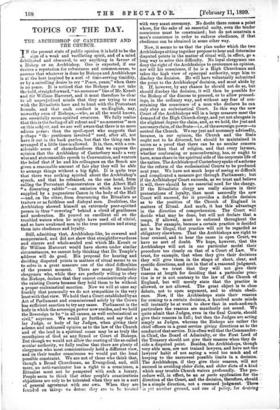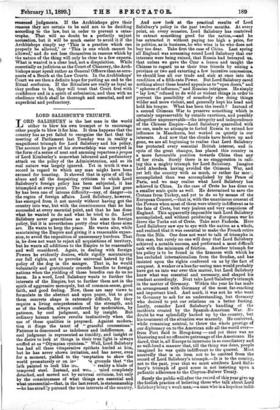TOPICS OF THE DAY.
THE ARCHBISHOP OF CANTERBURY AND THE CHURCH. IN the present state of public opinion it is held to be the sign of a weak and vacillating spirit, and of a mind debilitated and obscured, to say anything in favour of a Bishop or an Archbishop. One is expected, if one desires a reputation for robustness and common-sense, to assume that whatever is done by Bishops and Archbishops is at the best inspired by a sort of time.serving timidity, or by a snivelling desire to cry "Peace, peace," when there is no peace. It is noticed that the Bishops do not take the bold, straightforward, " no-nonsense" line of Mr. Kensit and Sir William Harcourt, and it must therefore be clear to all unprejudiced minds that they are trying to run with the Ritualistic hare and to bunt with the Protestant bounds. and that such conduct is un-English, nay, unworthy even of Bishops,—who, as all the world knows, are essentially mean-spirited creatures. We fully realise that this is the feeling of all robust and " no-nonsense " men on this subject, and we are well aware that there is no more odious person than the spoil-sport who suggests that p 'rhaps " th gentlemen involved " need, after all, not have it out, in the back garden, but that the thing can be arranged if a little time is allowed. It is, then, with a con- siderable sense of shamefacedness that we express the opinion that the Archbishop of Canterbury made a very wise and statesmanlike speech to Convocation, and venture the belief that if he and his colleagues on the 'Bench are given a reasonable amount of fair play they will be able to arrange things without a big fight. It is quite true that there was nothing spirited about the Archbishop's speech, and that be refrained, on the one hand, from calling the Protestant demonstrators at the Albert Hall " a dissenting rabble"—an omission which was kindly supplied by a pugnacious Canon in the body of the Hall —and, on the other, from denouncing the Ritualists as traitors or as faithless and disloyal men. Doubtless, the Archbishop showed himself an extremely poor-spirited person in thus " cowering" behind a cloud of gentleness and moderation. He poured an emollient oil on the troubled waters when be might have used oil of vitriol, and so have awakened men to the true position and stung them into obedience and loyalty.
Still, admitting that, Archbishop-like, he cowered and compromised, and did not show that straightforwardness and sincere and whole-souled zeal which Mr. Kensit or Sir William Harcourt would have shown under similar circumstances, we cannot help thinking that Dr. Temple's address will do good. His proposal for hearing and deciding disputed points in matters of ritual seems to us to solve in a great measure one of the chief difficulties of the present moment. There are many Ritualistic clergymen who, while they are perfectly willing to obey the Bishops, declare that they cannot conscientiously obey the existing Courts because they hold them to be without a proper ecclesiastical sanction. Now we will at once say frankly that personally we do not sympathise in the very least with that view. We hold that a Court established by an Act of Parliament and commissioned solely by the Crown has sufficient sanction to try any cause. Parliament is the body in which the sovereign power now resides, and we hold the Sovereign to be "in all causes, as well ecclesiastical as civil," supreme. We would go further, and say that a lay Judge, or body of lay Judges, when giving their solemn and unbiassed opinion as to the law of the Church and of the land in a spiritual cause may be as truly the mouthpiece of God as any Synod or Court of Bishops. But though we would not allow the ousting of the so-called secular authority, we fully realise that there are plenty of clergymen who most conscientiously hold a different view, and on their tender consciences we would put the least possible constraint. We are not of those who think that, though a Broad Churchman, an Evangelical, and, still more, an anti-vaccinator has a right to a conscience, a Ritualist must not be pampered with such a luxury. People seem to think that other people's conscientious objections are only to be tolerated when they are in a sort of general agreement with our own. When they are funneled on thin;; we detesc they are to be treated with very scant ceremony. No doubt there comes a point where, for the sake of an essential unity, even the tender conscience must be constrained; but do not constrain a, man's conscience in order to enforce obedience, if that obedience can be obtained in some other way.
Now, it seems to us that the plan under which the two Archbishops sitting together propose to hear and determine disputed points in the matter of ritual will, in effect, go a long way to solve this difficulty. No loyal clergyman can deny the right of the Archbishops to pronounce an opinion, nor will his conscience, if he is a High Churchman and takes the high view of episcopal authority, urge him to disobey the decision. He will have voluntarily submitted the point to the Archbishops' decision, and must abide by it. If, however, by any chance he should not do so, but should disobey the decision, it will then be possible for the Bishop of the diocese to proceed, or to allow proceed- ings, in the ordinary way, and without any fear of con- straining the conscience of a man who declares he can only obey an ecclesiastical Court. In this way the new Court of the Archbishops will in a large measure meet the demand of the High Church clergy, and yet not abrogate in the slightest degree the claim, and, as we hold, the just and necessary claim, of the State—i.e., of the sovereign power—to control the Church. We say just and necessary advisedly, because, in our opinion, the Church and the State ought not to be divorced, but should be maintained in union as a proof that there can be no secular concern greater than that of religion, and that every layman, whether conforming or nonconforming, has, or ought to have, some share in the spiritual side of the corporate life of the nation. The Archbishopof Canterburyspoke of a scheme for the reform of the ecclesiastical Courts to be produced next year. We have not much hope of seeing so difficult and complicated a measure got through Parliament ; but if the Ardhbishops' Court succeeds, as we trust and believe it will, there should be no essential need for the change. If the Ritualistic clergy are really sincere in their protestations of loyalty, then most assuredly the new Court will succeed, for it provides a definite decision as to the position of the Church of England in matters of Ritual. And mark, it has this advantage in the direction of comprehension. The Court will decide what may be done, but will not declare that a usage, if allowed, must be enforced throughout the land. For example, because a certain practice is decided not to be illegal, that practice will not be regarded as obligatory elsewhere. That the Archbishops are right to hear counsel, and to hear the cause in open Court, we have no sort of doubt. We hope, however, that 'the Archbishops will not in one particular model their procedure too closely on that of a Court of Law. We trust, for example, that when they give their decisions they will give them in the shape of short, clear, and specific directions, and not in that of a reasoned judgment. That is, we trust that they will not give their reasons at length for deciding that a particular prac- tice is or is not contrary to the law of the Church of England, but will merely state that the practice is allowed, or not allowed. The great object is to close debate, not to open argument, and to obtain obedi- ence. Now, if the Archbishops state their reasons for coming to a certain decision, a hundred acute minds will instantly be at work to show that in such-and-such particulars the reasons are manifestly not sound. We quite admit that Judges, even in the final Courts, should give their reasons in full ; but then the Judges are acting simply as Judges, whereas the Bishops are rather the chief officers in a great service giving directions as to the conduct of that service. It is often well that the Commander- - in-Chief, the Board of Admiralty, or the First Lord of the Treasury should not give their reasons when they de tide a disputed point. Besides, the Archbishops, though very able men, are not trained lawyers, and have not the lawyers' habit of not saying a word too much and of keeping to the narrowest possible limits in a decision. The Archbishops, if they give their reasons, will not succeed in avoiding obiter dicta, and obiter dicta of a kind which may trouble Church waters profoundly. The pro- cedure will, in effect, be an ez parte application for the direction of the Court, and the decision, therefore, should be a, simple direction, not a reasoned judgment. There is yet another ground, and one of policy, for desiring reasoned judgments. If the Archbishops give their reasons they are certain to be said not to be deciding according to the law, but in order to prevent a catas- trophe. That will no doubt be a, perfectly unjust accusation, but it will be much easier to avoid it if the Archbishops simply say ' This is a practice which can properly be allowed,' or ' This is one which cannot be allowed,' and do not lose themselves in reasons which by the nature of the thing will only be clear to a few experts. What is wanted is a clear lead, not a disquisition. While essentially as judicious as the Court of Chancery, the Arch- bishops must speak rather as General Officers than as occu- pants of a Bench at the Law Courts. In the Archbishops' Court we see then a definite hope for putting an end to the Ritual confusion. If the Ritualists are really as loyal as they profess to be, they will treat that Court first with confidence and in a spirit of submission, and then with an obedience which shall be thorough and essential, and not superficial and perfunctory.







































 Previous page
Previous page